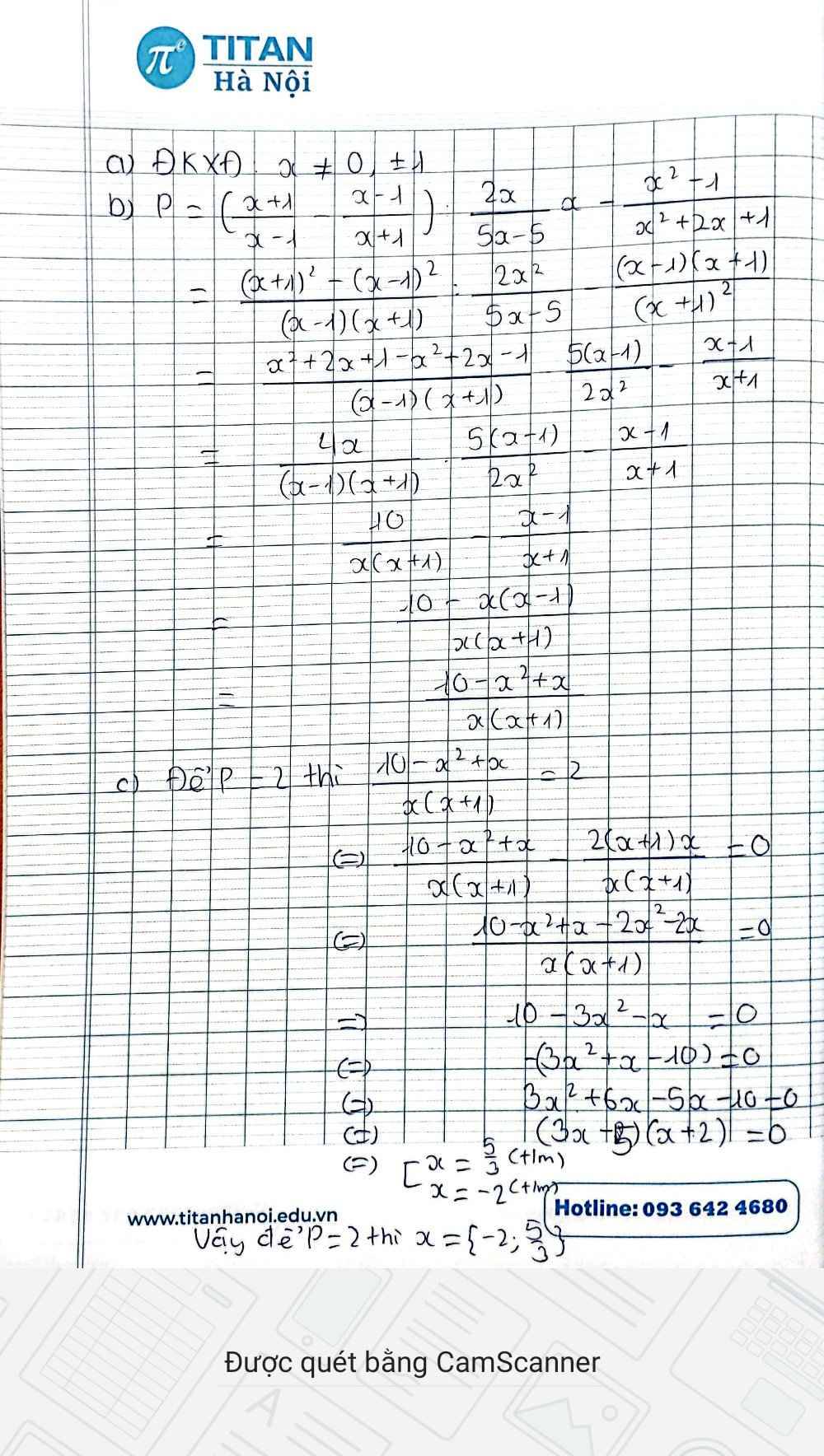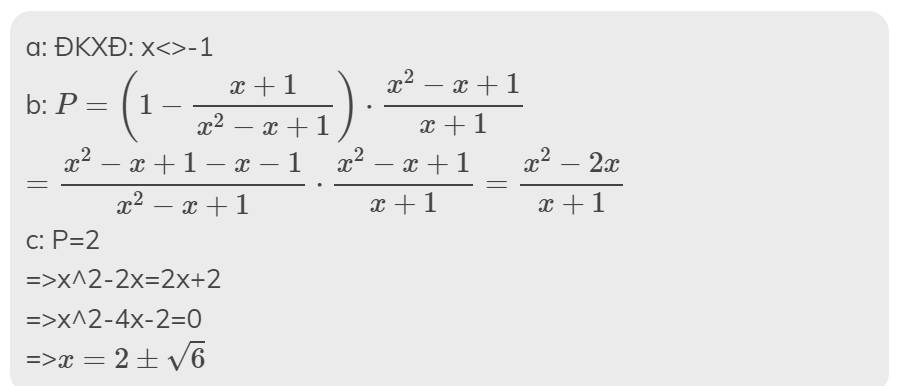Hãy nhập câu hỏi của bạn vào đây, nếu là tài khoản VIP, bạn sẽ được ưu tiên trả lời.

a: ĐKXĐ: x<>-1
b: \(P=\left(1-\dfrac{x+1}{x^2-x+1}\right)\cdot\dfrac{x^2-x+1}{x+1}\)
\(=\dfrac{x^2-x+1-x-1}{x^2-x+1}\cdot\dfrac{x^2-x+1}{x+1}=\dfrac{x^2-2x}{x+1}\)
c: P=2
=>x^2-2x=2x+2
=>x^2-4x-2=0
=>\(x=2\pm\sqrt{6}\)

1: Ta có: \(A=\left(\dfrac{x^2-16}{x-4}-1\right):\left(\dfrac{x-2}{x-3}+\dfrac{x+3}{x+1}+\dfrac{x+2-x^2}{x^2-2x-3}\right)\)
\(=\left(x+4-1\right):\left(\dfrac{\left(x-2\right)\left(x+1\right)}{\left(x-3\right)\left(x+1\right)}+\dfrac{\left(x+3\right)\left(x-3\right)}{\left(x+1\right)\left(x-3\right)}+\dfrac{-x^2+x+2}{\left(x-3\right)\left(x+1\right)}\right)\)
\(=\left(x+3\right):\dfrac{x^2+x-2x-2+x^2-9-x^2+x+2}{\left(x-3\right)\left(x+1\right)}\)
\(=\left(x+3\right):\dfrac{x^2-9}{\left(x-3\right)\left(x+1\right)}\)
\(=\dfrac{\left(x+3\right)\left(x-3\right)\left(x+1\right)}{x^2-9}\)
\(=x+1\)
ĐKXĐ: \(x\notin\left\{4;3;-1\right\}\)
2: Để \(\dfrac{A}{x^2+x+1}\) nhận giá trị nguyên thì \(x+1⋮x^2+x+1\)
\(\Leftrightarrow x^2+x⋮x^2+x+1\)
\(\Leftrightarrow x^2+x+1-1⋮x^2+x+1\)
mà \(x^2+x+1⋮x^2+x+1\)
nên \(-1⋮x^2+x+1\)
\(\Leftrightarrow x^2+x+1\inƯ\left(-1\right)\)
\(\Leftrightarrow x^2+x+1\in\left\{1;-1\right\}\)
\(\Leftrightarrow x^2+x\in\left\{0;-2\right\}\)
\(\Leftrightarrow x^2+x=0\)(Vì \(x^2+x>-2\forall x\))
\(\Leftrightarrow x\left(x+1\right)=0\)
\(\Leftrightarrow\left[{}\begin{matrix}x=0\\x+1=0\end{matrix}\right.\Leftrightarrow\left[{}\begin{matrix}x=0\left(nhận\right)\\x=-1\left(loại\right)\end{matrix}\right.\)
Vậy: Để \(\dfrac{A}{x^2+x+1}\) nhận giá trị nguyên thì x=0

ĐKXĐ: \(x\notin\left\{-1;-\dfrac{1}{2}\right\}\)
a) Ta có: \(P=\left(\dfrac{2x}{x^3+x^2+x+1}+\dfrac{1}{x+1}\right):\left(1+\dfrac{x}{x+1}\right)\)
\(=\left(\dfrac{2x}{\left(x+1\right)\left(x^2+1\right)}+\dfrac{x^2+1}{\left(x^2+1\right)\left(x+1\right)}\right):\left(\dfrac{x+1+x}{x+1}\right)\)
\(=\dfrac{x^2+2x+1}{\left(x+1\right)\left(x^2+1\right)}:\dfrac{2x+1}{x+1}\)
\(=\dfrac{\left(x+1\right)^2}{\left(x+1\right)\left(x^2+1\right)}\cdot\dfrac{x+1}{2x+1}\)
\(=\dfrac{x^2+2x+1}{\left(2x+1\right)\left(x^2+1\right)}\)
b) Vì \(x=\dfrac{1}{4}\) thỏa mãn ĐKXĐ
nên Thay \(x=\dfrac{1}{4}\) vào biểu thức \(P=\dfrac{x^2+2x+1}{\left(2x+1\right)\left(x^2+1\right)}\), ta được:
\(P=\left[\left(\dfrac{1}{4}\right)^2+2\cdot\dfrac{1}{4}+1\right]:\left[\left(2\cdot\dfrac{1}{4}+1\right)\left(\dfrac{1}{16}+1\right)\right]\)
\(=\left(\dfrac{1}{16}+\dfrac{1}{2}+1\right):\left[\left(\dfrac{1}{2}+1\right)\left(\dfrac{1}{16}+1\right)\right]\)
\(=\dfrac{25}{16}:\dfrac{51}{32}=\dfrac{25}{16}\cdot\dfrac{32}{51}=\dfrac{50}{51}\)
Vậy: Khi \(x=\dfrac{1}{4}\) thì \(P=\dfrac{50}{51}\)



a)P=x2-x+1 đkxđ:x\(\ne\)0;1
b)P=x2-x+1=(x-\(\dfrac{1}{2}\))2+\(\dfrac{3}{4}\)\(\ge\)\(\dfrac{3}{4}\) xảy ra dấu = khi x=\(\dfrac{-1}{2}\)
c)Q=\(\dfrac{2x}{P}\)=\(\dfrac{2}{x-1+\dfrac{1}{x}}\)\(\in\)Z đkxđ:x\(\ne\)0
\(\Rightarrow\)2\(⋮\)x-1+\(\dfrac{1}{x}\)\(\Rightarrow\)x-1+\(\dfrac{1}{x}\)\(\in\)U(2)={-2;-1;1;2}
giải ra x\(\in\){-\(\sqrt{\dfrac{5}{4}}\)+\(\dfrac{3}{2}\);\(\sqrt{\dfrac{5}{4}}\)+\(\dfrac{3}{2}\)}